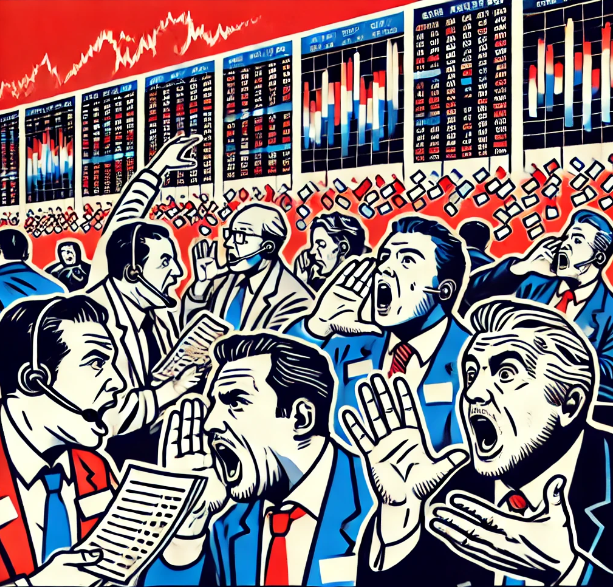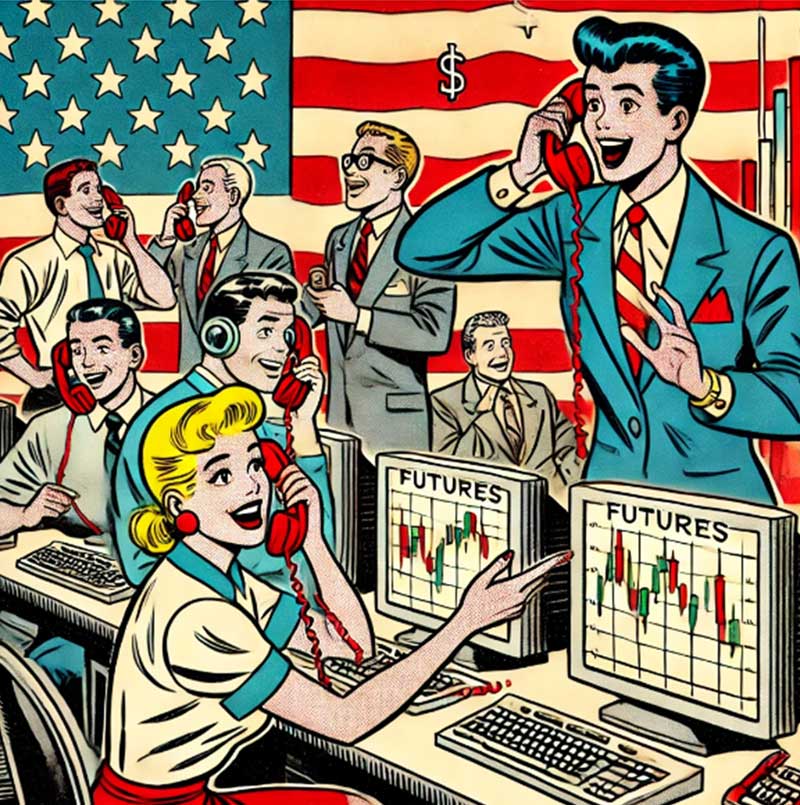Futures trading is a financial strategy that allows participants to buy or sell a commodity or financial instrument at a predetermined price and date in the future. This type of trading is heavily used in various industries, including agriculture, where it plays a critical role in helping farmers manage risks associated with price volatility. By engaging in futures trading, farmers can lock in prices for their crops or livestock before they are harvested or brought to market, allowing them to protect against unfavorable market movements.
In agriculture, futures markets are primarily used to hedge against the risks of fluctuating prices for commodities like grains, cattle, dairy products, and other essential agricultural goods. This mechanism provides security for farmers, enabling them to focus on production without worrying about unpredictable market conditions. The practice of farmers hedging their crops using futures contracts has been in place for over a century and remains a cornerstone of modern agricultural economics.
This essay will explore futures trading in detail, focusing specifically on how farmers hedge grains, cattle, and dairy using futures. We will delve into specific hedging techniques, highlight key examples, and discuss why it is vital for farmers to engage in futures markets to mitigate risks and stabilize income.
Futures Trading
Futures contracts are agreements between two parties to buy or sell a particular asset at a future date for a price agreed upon today. They are standardized contracts traded on regulated futures exchanges such as the Chicago Mercantile Exchange (CME) and the Intercontinental Exchange (ICE). The contracts typically involve commodities like corn, wheat, soybeans, cattle, and dairy products in the agricultural sector.
Each futures contract specifies the quantity of the commodity, the quality (if applicable), and the delivery date. Farmers, who produce commodities, and buyers, such as food manufacturers or feed producers, often use futures contracts to stabilize prices.
Key concepts in futures trading include:
- Long Position: The buyer of a futures contract takes a long position, meaning they agree to buy the asset at the contract’s expiration. This position benefits from rising prices.
- Short Position: The seller takes a short position, agreeing to sell the asset at the contract’s expiration. This position benefits from falling prices.
- Hedging: In futures trading, hedging is a strategy used to offset the risk of price movements by taking an opposite position in the futures market. For farmers, hedging involves locking in a future price for their crops or livestock to protect against adverse price fluctuations.
- Speculation: Speculators trade futures contracts to profit from anticipated price movements but have no interest in the underlying commodity. This contrasts with hedgers, who use futures contracts to reduce risk.
Why Farmers Use Futures Trading
Farmers are exposed to a high degree of price risk due to various factors such as weather conditions, market supply and demand dynamics, and geopolitical events. Price volatility can be particularly damaging, as farming involves significant upfront costs, and prices can fluctuate dramatically between planting and harvesting.
Futures trading provides farmers with a tool to mitigate these risks by offering a mechanism to lock in prices for their crops and livestock, enabling more predictable revenue streams. By selling futures contracts for their anticipated production, farmers can hedge against the risk of falling prices when it comes time to bring their goods to market.
Farmers trade and hedge on the futures market for several key reasons:
- Risk Management: Futures contracts allow farmers to lock in a price for their products, which can protect against sudden price drops. This is especially important for grains and livestock, which are subject to unpredictable market fluctuations.
- Income Stability: By locking in prices, farmers ensure they receive a predictable income, regardless of how the market performs. This stability is crucial for budgeting and financial planning, especially for small to medium-sized farms.
- Market Access: Futures markets provide farmers with access to a global market of buyers, increasing liquidity and ensuring they can sell their products even when local demand is low.
- Price Discovery: Futures markets are a source of price discovery, helping farmers make informed decisions about production and marketing strategies.
Farmers Hedging Grains
Grain farmers, including those producing corn, wheat, soybeans, and rice, face significant risks due to volatile prices driven by weather, demand shifts, and geopolitical events. Grain prices can be extremely sensitive to unexpected changes in supply and demand, making futures contracts an essential tool for managing risk.
A corn farmer who anticipates a harvest of 10,000 bushels in six months can sell corn futures contracts to hedge against the risk of declining prices. If the farmer expects that corn prices might drop during the growing season, they can sell enough futures contracts to cover the value of their expected harvest.
For instance, if corn is currently trading at $5 per bushel, the farmer can sell a futures contract for 10,000 bushels at that price. Regardless of whether the price of corn rises or falls, the farmer has secured the $5 price, ensuring that they will receive $50,000 (10,000 bushels * $5) when the crop is harvested and sold.
If, at harvest time, the price of corn has dropped to $4 per bushel, the farmer will benefit from their hedge. While they may only receive $40,000 from selling the physical crop at the market price, they will make a $10,000 gain from the futures contract (since they sold at $5 but the market price is now $4), effectively securing the original $50,000.
Example: Hedging Wheat with Futures
Wheat farmers can also hedge their production using futures contracts in a similar manner. Let’s assume a wheat farmer is concerned about prices declining before harvest. The farmer expects to produce 5,000 bushels of wheat and decides to sell wheat futures contracts.
If the current price of wheat is $7 per bushel, the farmer can sell futures contracts to lock in that price. When the harvest is ready, if the market price of wheat has fallen to $6 per bushel, the farmer will have effectively shielded themselves from the $1 per bushel loss, as the futures contract sale would offset the decrease.
Farmers Hedging Cattle
Livestock farmers, particularly those raising cattle, face significant risks related to feed costs, fluctuating demand for beef, and diseases affecting herds. The price of cattle can fluctuate significantly based on these factors, so cattle producers often turn to the futures market to hedge their risk.
Example: Hedging Live Cattle with Futures
A rancher who is raising cattle and expects to bring 100 head of cattle to market in six months might be concerned about the potential for falling beef prices. They can hedge this risk by selling live cattle futures contracts.
If live cattle futures are currently priced at $120 per hundredweight (cwt) and each cow weighs an average of 1,200 pounds, the rancher can lock in a price of $1,440 per cow (120 cwt * $120). By selling futures contracts equivalent to the expected weight of the cattle, the rancher ensures they will receive $144,000 for the cattle, regardless of how the market price fluctuates.
If the price of live cattle falls to $110 per cwt by the time the cattle are ready for sale, the rancher will only receive $132,000 in the physical market but will offset the $12,000 loss with gains from the futures contract.
Example: Hedging Feeder Cattle with Futures
Feeder cattle, typically younger and lighter than live cattle, are also subject to futures trading. Feeder cattle prices are influenced by feed costs and market demand, and many cattle producers hedge their risk by selling feeder cattle futures.
If a cattle producer expects to sell 200 head of feeder cattle weighing 500 pounds each in four months, and the current price is $150 per cwt, the producer can sell futures contracts to lock in a price of $750 per head. This protects against price declines that could occur between the time the futures contract is sold and when the cattle are brought to market.
Farmers Hedging Dairy
Dairy farmers also use futures markets to hedge against fluctuations in the price of milk, cheese, butter, and other dairy products. Dairy prices can be highly volatile due to seasonal changes in milk production, feed costs, and global demand.
Example: Hedging Milk with Futures
A dairy farmer who produces 1,000 gallons of milk per day may be concerned about future milk prices falling due to increased supply. The farmer can hedge against this risk by selling Class III milk futures contracts, which are based on the price of milk used for cheese production.
If Class III milk futures are trading at $15 per hundredweight, the farmer can sell futures contracts to lock in that price. If, by the time the milk is sold, the market price has fallen to $13 per hundredweight, the farmer will have mitigated the loss by gaining from the futures contracts.
Why Farmers Should Hedge with Futures
Hedging with futures offers numerous benefits for farmers, enabling them to manage price risk effectively and stabilize their incomes in the face of market volatility. Some of the key reasons why farmers should engage in futures markets include:
- Protection from Price Fluctuations: Futures contracts allow farmers to lock in prices for their crops and livestock, ensuring they receive a guaranteed price even if market conditions deteriorate.
- Budgeting and Financial Planning: By locking in future prices, farmers can make more accurate financial projections and budget more effectively for the year ahead.
- Market Flexibility: Futures markets provide farmers with greater flexibility to sell their products when prices are favorable, reducing the need to rush crops or livestock to market when prices are low.
- Access to Global Markets: Futures trading enables farmers to participate in global markets, expanding their potential customer base and ensuring they can sell their products even when local demand is weak.
- Price Discovery: Futures markets provide a transparent mechanism for price discovery, helping farmers make informed decisions about what crops or livestock to produce based on current market signals.
Futures trading offers a vital tool for farmers seeking to hedge against price risks and stabilize their incomes in the face of volatile market conditions. By engaging in futures markets, farmers can lock in prices for their grains, cattle, dairy, and other products, protecting themselves from unfavorable price movements.
Whether it’s a corn farmer hedging their crop, a cattle rancher locking in beef prices, or a dairy producer stabilizing milk revenues, futures trading plays a critical role in modern agriculture. For farmers looking to ensure financial stability and reduce risk, participating in futures markets is not just a smart choice—it’s a necessity in today’s unpredictable global economy.
To open an account with E-Futures.com, please click here.
Ready to start trading futures? Call US 1(800)454-9572 – Int’l (310)859-9572 email info@cannontrading.com and speak to one of our experienced, Series-3 licensed futures brokers and start your futures trading journey with E-Futures.com today.
Disclaimer – Trading Futures, Options on Futures, and retail off-exchange foreign currency transactions involves substantial risk of loss and is not suitable for all investors. Past performance is not indicative of future results. You should carefully consider whether trading is suitable for you in light of your circumstances, knowledge, and financial resources. You may lose all or more of your initial investment. Opinions, market data, and recommendations are subject to change at any time.
Important: Trading commodity futures and options involves a substantial risk of loss. The recommendations contained in this writing are of opinion only and do not guarantee any profits. This writing is for educational purposes. Past performances are not necessarily indicative of future results.
**This article has been generated with the help of AI Technology. It has been modified from the original draft for accuracy and compliance.
***@cannontrading on all socials.








